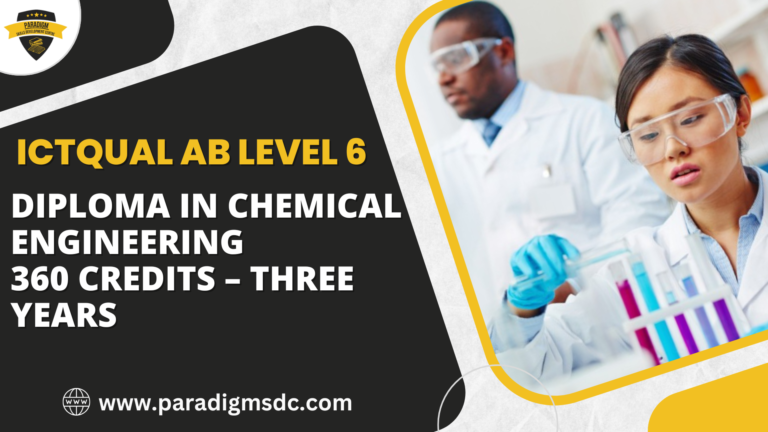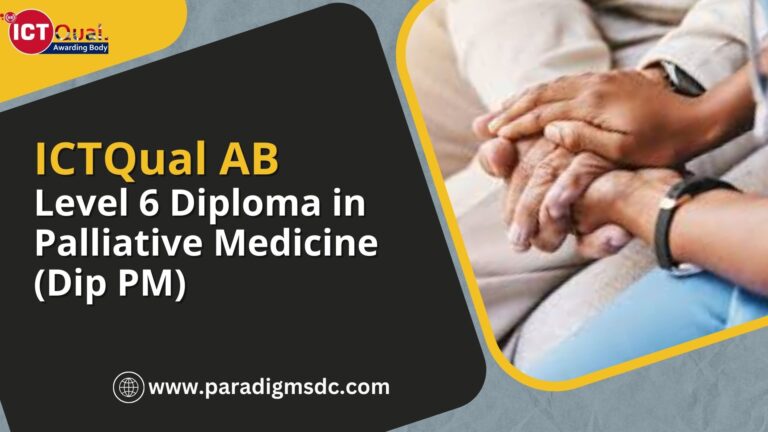Course Introduction
The ICTQual Level 3 Diploma in Medical Technician is a comprehensive training program tailored for individuals aiming to become proficient medical technicians. This course provides a robust foundation in medical technology, laboratory practices, and patient care, preparing students for various roles within the healthcare sector.
Course Overview
This diploma course offers a blend of theoretical knowledge and practical experience, ensuring students gain a well-rounded education. The curriculum covers essential medical and technical subjects, complemented by hands-on training in laboratory settings. The course duration spans several months, with a structured learning path that meets industry standards and best practices.
Course Study Units
- Introduction to Medical Laboratory Science
- Clinical Pathology
- Laboratory Techniques and Procedures
- Quality Assurance and Quality Control
- Instrumentation and Automation
- Medical Terminology and Documentation
- Clinical Practicum
- Professional Development and Career Readiness
Learning Outcomes
Upon completing the course, students will be able to:
- Introduction to Medical Laboratory Science
- Understand the fundamental principles and practices of medical laboratory science.
- Describe the role of medical laboratory technicians in healthcare settings.
- Identify the importance of laboratory safety, regulations, and ethical considerations.
- Clinical Pathology
- Explain the pathological processes underlying various diseases and conditions.
- Identify common laboratory tests used for diagnosing and monitoring diseases.
- Interpret laboratory test results and their significance in clinical practice.
- Laboratory Techniques and Procedures
- Demonstrate proficiency in performing laboratory techniques such as specimen collection, handling, and processing.
- Execute laboratory procedures accurately and efficiently while adhering to established protocols.
- Utilize appropriate laboratory equipment and instrumentation effectively.
- Quality Assurance and Quality Control
- Understand the principles of quality assurance and quality control in medical laboratories.
- Implement quality control measures to ensure the accuracy and reliability of laboratory test results.
- Identify and troubleshoot issues related to quality assurance and quality control processes.
- Instrumentation and Automation
- Describe the function and operation of common laboratory instruments and automation systems.
- Perform maintenance and calibration procedures for laboratory equipment and instrumentation.
- Utilize computerized systems and software for data analysis and result interpretation.
- Medical Terminology and Documentation
- Acquire proficiency in medical terminology relevant to laboratory science and healthcare.
- Demonstrate the ability to accurately document laboratory test results and patient information.
- Communicate effectively with healthcare professionals using appropriate medical terminology.
- Clinical Practicum
- Apply theoretical knowledge and laboratory skills in a clinical setting under supervision.
- Perform laboratory tests, analyze results, and interpret findings in real-world patient care scenarios.
- Demonstrate professionalism, teamwork, and effective communication in the clinical environment.
- Professional Development and Career Readiness
- Develop essential professional skills such as communication, teamwork, and problem-solving.
- Explore career pathways in medical laboratory science and identify opportunities for further education and advancement.
- Prepare for job interviews, professional certification exams, and lifelong learning in the field of medical technology.
Course Benefits
- Comprehensive Education: Gain a broad understanding of medical technology and patient care.
- Hands-On Experience: Develop practical skills through laboratory simulations and clinical placements.
- Industry-Relevant Skills: Learn the latest techniques and best practices in medical technology.
- Career Readiness: Be prepared to enter the workforce as a qualified medical technician.
- Recognized Qualification: Earn a diploma that enhances your career prospects in the healthcare industry.
Who is this Course For?
This course is ideal for:
- Individuals aspiring to start a career as a medical technician.
- Current healthcare workers looking to expand their skills and knowledge.
- Students interested in pursuing a career in medical technology and laboratory sciences.
- Professionals seeking to transition into the healthcare field with a focus on technical and diagnostic roles.
Future Progression
Graduates of the ICTQual Level 3 Diploma in Medical Technician can explore various career opportunities and further education options, including:
- Employment: Work as a medical technician in hospitals, diagnostic laboratories, and clinics.
- Advanced Certifications: Pursue specialized certifications in areas such as phlebotomy, radiology, or clinical chemistry.
- Higher Education: Enroll in advanced degree programs in medical technology, laboratory sciences, or related healthcare fields.
- Specializations: Focus on specific areas like histology, microbiology, or medical imaging for career advancement.
The ICTQual Level 3 Diploma in Medical Technician provides a solid foundation for those looking to make a significant impact in the healthcare industry. With a combination of theoretical knowledge and practical skills, this course prepares you for a rewarding career dedicated to improving patient outcomes and advancing medical technology. If you are passionate about healthcare and technology, this diploma is your gateway to success.







